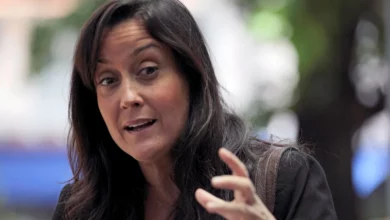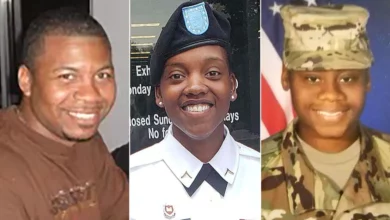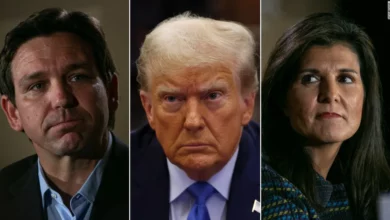
The barely-disguised delight in Moscow that greeted Donald Trump's victory on November 8 has gradually melted into a mixture of confusion and frustration.
And that in turn has led to a cold-eyed reappraisal among Russian officials of what can be achieved with the Trump Administration.
The reappraisal was crisply expressed by President Putin's spokesman, Dmitri Peskov, last week, when he told CNN: "We have heard various statements by President Trump. We are full of patience and we are waiting for the moment when the statements are followed by actions."
But "actions" — in the Russian view — are being sabotaged by what officials here describe as the highly-charged emotional atmosphere in Washington.
Even before President Trump's inauguration, Peskov complained about allegations of Russian-sponsored hacking in the US.
"Clearly there are those who are creating hysteria, who are trying to support this witch hunt," he said in January.
Foreign Minister Sergey Lavrov also used the term "witch hunt" Friday to describe the uproar over meetings between the Russian ambassador in Washington, Sergey Kislyak, and Trump associates.
Trump himself has said that the uproar could damage relations.
At his news conference on February 16, the US President said: "If you were Putin right now, you would say, 'Hey, we're back to the old games with the United States; there's no way Trump can ever do a deal with us.'"
The Kremlin agenda
Moscow would like to see — as soon as possible — concrete plans for tackling terrorism, co-operation in Syria and negotiations on missile defenses in Europe and nuclear weapons.
Most of all it wants the relaxation of international sanctions imposed on Russian individuals and companies following the annexation of Crimea in 2014.
In Peskov's view: "Without the two biggest countries working together, US and Russia, it's just impossible to be effective in this war on terrorism." But Russia is still waiting for the White House to decide on a new Syria policy, and on how it intends to scale up — as President Trump has promised — the war on ISIS.
There are tentative signs of co-operation on the ground in Syria, but the United States has not been involved in the Russian-led peace process.
There is no rapprochement in sight on other issues. While President Trump at times in the campaign left the door open to reconsidering sanctions against Russia, several of his appointees have since taken a much harder line.
Secretary of State Rex Tillerson, who had direct access to Putin as CEO of Exxon, said the US needed to be "clear-eyed" about Russia.
"Russia today poses a danger….It has invaded Ukraine, including the taking of Crimea, and supported Syrian forces that brutally violate the laws of war," he said at Senate confirmation hearings.
The sentiment was echoed by US Defense Secretary Jim Mattis: "There's a decreasing number of areas where we can engage cooperatively, and an increasing number of areas where we're going to have to confront Russia."
And then new CIA Director Mike Pompeo chimed in on the hacking allegations: "It's pretty clear about what took place here, about Russian involvement in efforts to hack information and to have an impact on American democracy" — efforts he said directed by senior leadership inside Russia.
One of the more pro-Russian voices in the new Administration, Mike Flynn, was gone after just 24 days in office as National Security Adviser, after he admitted giving "incomplete information" regarding his phone calls with Russian ambassador Kislyak.
His replacement, Lt. Gen. H R McMaster, is of a different persuasion.
In 2015, McMaster said that Russia wants "to collapse the post-World War Two, certainly the post-Cold War, security, economic, and political order in Europe and replace that order with something that is more sympathetic to Russian interests."
The bromance that never was?
To some veteran observers in Moscow, the Trump-Putin rapport was overcooked in the first place.
"There was a lot of hype in the US media about the relationship, about the bromance. I don't know where people got that from," says Dmitri Trenin of the Carnegie Institute in Moscow.
"What Russia wanted from the US ideally would have amounted to a foreign policy revolution in the US — something not to be had," Trenin added.
Some believe the relationship is doomed to be frozen in historic rivalry. Military analyst Pavel Felgenhauer told CNN: "The differences between vested interested between Moscow and Washington are too important — especially the military industrial complexes on both sides."
So, Felgenhauer says, the Russian military will try to use Trump's proposed defense budget increase (which at US$54 billion is equivalent to the entire Russian budget) to secure more money from the finance ministry.
Trenin predicts that as in the past, the Washington-Moscow relationship will fluctuate between competition and confrontation.
There are signs that Russia is already testing the resolve of the new Administration. In February, the Kremlin announced it would recognize the travel documents of people living in eastern Ukraine amid an upsurge of clashes.
Russia has also solidified its relationship with Iran, even as President Trump castigates the nuclear deal. And, according to US officials, Russia has begun to deploy a new generation of medium-range nuclear missiles, contravening a decades-old treaty. Russia denies it has breached the treaty.
Deficit of respect
In a piece marking the fifth anniversary of Putin's election (for the second time) as President, Russian state news agency Tass recalled his words from 2014: "As soon as we begin to rise, someone instantly tries to push Russia backwards, to let it know its place, to slow it down."
Whatever happens in Washington, the Kremlin insists the relationship must be one of equals, that the "deficit of respect" of recent years, as Peskov puts it, must be replaced by dialogue.
Trenin is not optimistic. "What the Russians want is to be treated as a co-equal partner— that's not going to happen," he told CNN.
For now, they are hedging their bets in Moscow. According to a survey carried out by the Russian news agency Interfax, Trump was mentioned 202,000 times in the Russian media in January — comfortably ahead of Putin's 147,000 mentions. It's a remarkable comparison given the tight state control of the media.
Perhaps normality is reasserting itself. In February, Putin was just shy of 154,000 references. Trump had 143,000 mentions.
The days when Donald Trump as a candidate tweeted "Wouldn't it be nice if we actually got along with Russia?" seem a long time ago.




